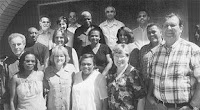Models for Ministry
 "Then Jesus came to them and said, "All authority in heaven and on earth has been given to me. Therefore go and make disciples of all nations, baptizing them in the name of the Father and of the Son and of the Holy Spirit, and teaching them to obey everything I have commanded you. And surely I am with you always, to the very end of the age." --Matthew 28:18-20 (NIV)
"Then Jesus came to them and said, "All authority in heaven and on earth has been given to me. Therefore go and make disciples of all nations, baptizing them in the name of the Father and of the Son and of the Holy Spirit, and teaching them to obey everything I have commanded you. And surely I am with you always, to the very end of the age." --Matthew 28:18-20 (NIV)When it comes to trying to obey the great commission, there certain actions that we must take as essential in fulfilling it. For instance the main verb that is in the imperative is "make disciples", however there word "go" is a participle which derives its sense of meaning in relation to the main verb. We can not make disciples of "all nations" without going. The two things we need to do to make disciples is to baptize them and teach them to obey.

As we look at ways to fulfill the great commission, we have different ways to attempt to carry this out, all of them must involve baptizing and teaching. Wycliffe Bible Translators attempt to define which language groups need the Bible in their language, study the language, train people to read their native language, and translate the Bible into that language. Each step in the process is intensive. Wycliffe is one of the largest mission agencies. They are intentional in giving every language a copy of the Bible, still yet they have come to the conclusion that their current rate of translation using processes they have used for a number of years, it would take an absorbent amount of time. It sort of becomes an equation; X number of people who can meet the
 qualifications need Y number of givers to support them on the field. Those people who can meet the qualifications is rare. A large component of these people going is their ability to raise funds to support them in their work. Then there is tremendous educational challenges along with the ability to face hardships in the field. So they have concluded that there is a need for indigenous translators if the task of Bible translation is to be accomplished.
qualifications need Y number of givers to support them on the field. Those people who can meet the qualifications is rare. A large component of these people going is their ability to raise funds to support them in their work. Then there is tremendous educational challenges along with the ability to face hardships in the field. So they have concluded that there is a need for indigenous translators if the task of Bible translation is to be accomplished.Peter Wagoner has said that church planting is one of the most effective strategies for fulfilling the great commission. Church planting looks different in different denominations (or undenominations). In some denominations church planting looks like establishing a Bible study. In others, a church plant can only be done by the truly gifted, those who can preach, counsel, and be a visionary who has great organizational leadership skills need only apply. However, this sort of thinking actually give an equation that is similar to the Bible translation dilemma; do we let the task go undone or do we accept people who are not ideal for the task. There are only so many people who meet the qualification and only so much money to support them.

Evangelical church might consider the possibility that there is more than one model for church planting; some models look like a large programmatic approach, some look like a consortium of families who form a church around the Christian education of their children, some look like a grouping of small groups (cell groups) and others look like a house church. The PCA, which is the denomination to which I and my family belong, has churches of the first two types. Opening the doors for different models could open up opportunities where they did not exist before. I would propose that the PCA needs to embrace more creative models, perhaps even experimenting with various models.

Comments